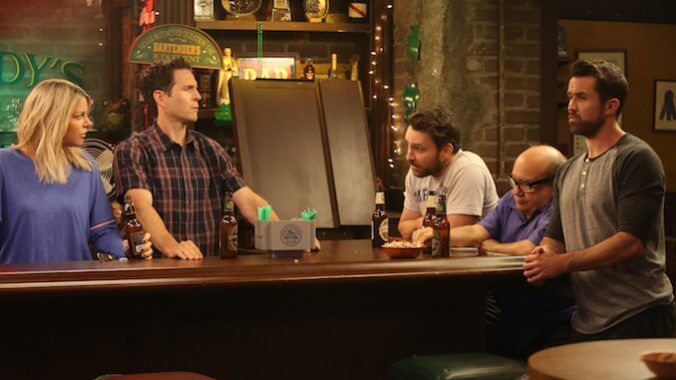Can The Gang Branch Out?
Photo courtesy of FX
This month, It’s Always Sunny in Philadelphia stars Charlie Day and Glenn Howerton both had new films to promote—hitting theaters on the same day, no less. It’s not like Day and Howerton haven’t worked in film before, but the debut of these two films do mark something crucially different for the two actors. Howerton’s BlackBerry, a bio-drama chronicling the rise and crash of the eponymous cell phone company, sees the Juilliard-trained actor in his first real, starring, mainstream film role—like, he is literally one of the two guys on the film’s official poster. And Day’s Fool’s Paradise marks the directorial debut of an actor who found a decade’s worth of Hollywood notoriety largely playing second fiddle. BlackBerry and Fool’s Paradise feel like they could be a turning point for both of the gifted performers: Howerton has spent most of Sunny’s run overlooked outside of sporadic or short-lived television spots, and Day rose to popularity post-Horrible Bosses and Pacific Rim, but has flatlined with a series of voice roles and middling comedies. The best work both actors get to do is still on their own show.
But the same could be said of Sunny’s two other non-Danny DeVito stars, Rob McElhenney and Kaitlin Olson, even though Day is, quite plainly, the only actor from the cult FX sitcom to really hit a stride outside of the show. To call Always Sunny “cult” doesn’t feel quite right, however: in the whopping 15 years since the show premiered, it’s attained a sprawling, passionate fanbase, and its fifteenth season brought it the esteem of being the second-longest-running American comedy show of all time without ever having been nominated for an Emmy, aside from the stunt coordination category. Yet its cultural presence can be felt everywhere; it’s difficult to go online without scrolling past at least one screengrab or GIF from the show used as a meme. Phrases and lines of dialogue—like “When I’m dead, just throw me in the trash,” “Pepe Silvia,” “The economy is in shambles,” and “Wildcard, bitches”—have permeated the everyday lexicon. Paddy’s Pub t-shirts can be seen worn everywhere, by everyone, at any time.
The influence Sunny has wrought on pop culture is undeniable. Yet its creators and lead cast members, Day, Howerton, and McElhenney, are aware that their show remains somewhat “niche.” It’s something that they have expressed frequently on their podcast, The Always Sunny Podcast, and they do so with an earnest pride—they understand that the show has the popularity that it does because they’ve stayed true to themselves, their specific sense of humor, and the art that they want to create. Thus, Sunny undoubtedly exists in this weird liminal space of massive appeal for one particular audience, even if that appeal has spread its tendrils to most other corners of pop culture. Because, yes, in spite of its influence and enormous popularity, it is still rarely nominated for mainstream awards. At this point, however, it’s part of the show’s charm: it still manages to be something of an underdog. But the Emmys snubs (and, really, who cares?) still speak to where the show sits on the proverbial totem pole. It’s very likely that Sunny’s fanbase matches, or even exceeds, that of Succession’s, though in large part due to re-watches and streaming (of which viewing numbers are notoriously opaque).
Because Sunny lives in this comfortable cultural purgatory, it has thus made it difficult for the core cast to branch out from the show—in a similarly Friends or Seinfeld-esque fashion, but far more niche. Not that they are desperate to get away from the sitcom that they nurtured into fruition and brought them wealth, success, and artistic freedom. But the enormous talent of Day, Howerton, McElhenney, and Olson has become indisputable yet largely sequestered to their own show. Olson recently starred as the stock love interest in Bobby Farrelly’s Champions alongside Woody Harrelson’s protagonist, charming enough throughout the film but only given one moment in which the gifted physical comedian is allowed to actually show off her skills. Howerton starred alongside Patton Oswalt in the short-lived though moderately well-received cable sitcom, A.P. Bio. Day broke through as the shrill Dale in Horrible Bosses back in 2011, but never really had another moment like that since, despite continuing to work regularly in mainstream film (recently co-voice starring in The Super Mario Bros. Movie). All four of them tend to pop up in various TV and movie cameos, the creators seemingly aware that having them on will be a net positive while dodging the wherewithal to give them a prominent part.
-

-

-

-

-

-

-

-

-

-

-

-

-

-

-

-

-

-

-

-

-

-

-

-

-

-

-

-

-

-

-

-

-

-

-

-

-

-

-

-








































